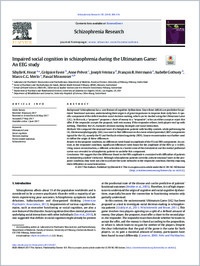Impaired social cognition in schizophrenia during the Ultimatum Game: An EEG study
- Horat, Sibylle K. Laboratory for Psychiatric Neuroscience and Psychotherapy, Department of Medicine, Faculty of Science, University of Fribourg, Switzerland
- Favre, Grégoire Sector of Psychiatry and Psychotherapy for Adults, Mental Health Network Fribourg (RFSM), Marsens, Switzerland
- Prévot, Anne School of Health Sciences (HEdS-FR), University of Applied Sciences and Arts Western Switzerland, Fribourg, Switzerland
- Ventura, Joseph Department of Psychiatry and Biobehavioral Sciences, University of California Los Angeles (UCLA), Los Angeles, CA, USA
- Herrmann, François R. Department of Rehabilitation and Geriatrics, University Hospitals of Geneva, Switzerland
- Gothuey, Isabelle Sector of Psychiatry and Psychotherapy for Adults, Mental Health Network Fribourg (RFSM), Marsens, Switzerland
- Merlo, Marco C. G. Laboratory for Psychiatric Neuroscience and Psychotherapy, Department of Medicine, Faculty of Science, University of Fribourg, Switzerland
- Missonnier, Pascal Laboratory for Psychiatric Neuroscience and Psychotherapy, Department of Medicine, Faculty of Science, University of Fribourg, Switzerland - Sector of Psychiatry and Psychotherapy for Adults, Mental Health Network Fribourg (RFSM), Marsens, Switzerland
-
01.02.2018
Published in:
- Schizophrenia Research. - 2018, vol. 192, p. 308–316
English
Schizophrenia has a core feature of cognitive dysfunctions. Since these deficits are predictive for patients' functional outcome, understanding their origin is of great importance to improve their daily lives. A specific component of the deficit involves social decision-making, which can be studied using the Ultimatum Game (UG). In this task, a “proposer” proposes a share of money to a “responder”, who can either accept or reject this offer. If the responder accepts the proposal, both win money. If the responder refuses, both players end up with nothing. Therefore, the UG evaluates decision-making strategies and social interaction.Methods: We compared the neuronal bases of schizophrenic patients with healthy controls, while performing the UG. Electroencephalography (EEG) was used to find differences in the event-related potential (ERP) components typical for the UG, namely the P2 and feedback-related negativity (FRN). Source reconstruction was further used to define the origin of these differences.Results: In the proposer condition, no differences were found in amplitude of the P2 and FRN components. In contrast, in the responder condition, significant differences were found for the amplitude of the FRN (p = 0.009). Using source reconstruction, a different activation in a border zone of the dorsolateral and the medial prefrontal cortex was revealed in schizophrenic patients to underlie this component.Conclusions: We suggest that the difference found in the FRN amplitude is associated with difficulties of patients in interpreting another's behavior. Although schizophrenic patients correctly activate neuronal bases in the proposer condition, they were not able to activate the same networks in the responder condition, thereby exposing their difficulties in social interaction.
- Faculty
- Faculté des sciences et de médecine
- Department
- Médecine 3ème année
- Language
-
- English
- Classification
- Medicine
- License
-
License undefined
- Identifiers
-
- RERO DOC 309047
- DOI 10.1016/j.schres.2017.05.037
- Persistent URL
- https://folia.unifr.ch/unifr/documents/306528
Statistics
Document views: 111
File downloads:
- pdf: 185
